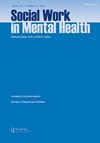COVID-19 job and income loss and mental health: the mediating roles of financial assets and well-being and the moderating role of race/ethnicity
IF 0.9
Q3 SOCIAL WORK
引用次数: 3
Abstract
ABSTRACT Prior research shows unemployment has a negative effect on mental health, yet whether this relationship is affected by financial factors is unknown. For example, having money in savings may mitigate the impact of job loss on mental health. We use structural equation modeling with data from the Socio-Economic Impacts of COVID-19 Survey with a nationally representative sample (N = 3,341) to examine COVID-19 related job loss and mental health as partially mediated by liquid assets and Financial Well-Being (FWB) and moderated by race and ethnicity as moderators. More than a quarter (28.34%) of participants said they experienced a job or income loss due to COVID-19, which was associated with greater psychological distress as measured by the PHQ-4. The structural model had excellent fit (RMSEA = 0.021); FWB partially mediated the relationship between job/income loss and mental health (p < .001), accounting for 49% of the total effect. However, liquid financial assets did not partially mediate this relationship. Black participants experienced very different direct and indirect effects. Social workers should assess and intervene concerning financial factors when individuals experience job loss. Job loss is different among Black individuals who face greater challenges related to structural racism yet also have greater resilience.COVID-19工作和收入损失与心理健康:金融资产和福祉的中介作用以及种族/族裔的调节作用
以往的研究表明失业对心理健康有负面影响,但这种关系是否受到经济因素的影响尚不清楚。例如,有存款可以减轻失业对心理健康的影响。我们使用结构方程模型和来自COVID-19调查的社会经济影响的数据,具有全国代表性的样本(N = 3,341)来检验COVID-19相关的失业和心理健康是否部分由流动资产和财务状况(FWB)介导,并由种族和民族作为调节因子调节。超过四分之一(28.34%)的参与者表示,他们因COVID-19而失去了工作或收入,根据PHQ-4的测量,这与更大的心理困扰有关。结构模型拟合良好(RMSEA = 0.021);FWB在工作/收入损失与心理健康之间起到部分中介作用(p < 0.001),占总效应的49%。然而,流动金融资产并没有部分调解这种关系。黑人参与者经历了非常不同的直接和间接影响。当个人经历失业时,社会工作者应该评估和干预经济因素。黑人的失业情况不同,他们面临着与结构性种族主义有关的更大挑战,但也有更大的适应能力。
本文章由计算机程序翻译,如有差异,请以英文原文为准。
求助全文
约1分钟内获得全文
求助全文
来源期刊

Social Work in Mental Health
SOCIAL WORK-
CiteScore
1.90
自引率
0.00%
发文量
34
期刊介绍:
Social Work in Mental Health is an exciting contribution from the editors of our highly respected journal, Social Work in Health Care. This journal offers quality articles on clinical practice, education, research, collaborative relationships, mental health policy, and the delivery of mental health care services. This scholarly, creative, and lively journal presents material valuable to social workers in all sectors of mental health care. It is devoted to social work theory, practice, and administration in a wide variety of mental health care settings. Social Work in Mental Health will help you improve your practice in these areas, demonstrating the vital role of social services in mental health care delivery systems.
 求助内容:
求助内容: 应助结果提醒方式:
应助结果提醒方式:


